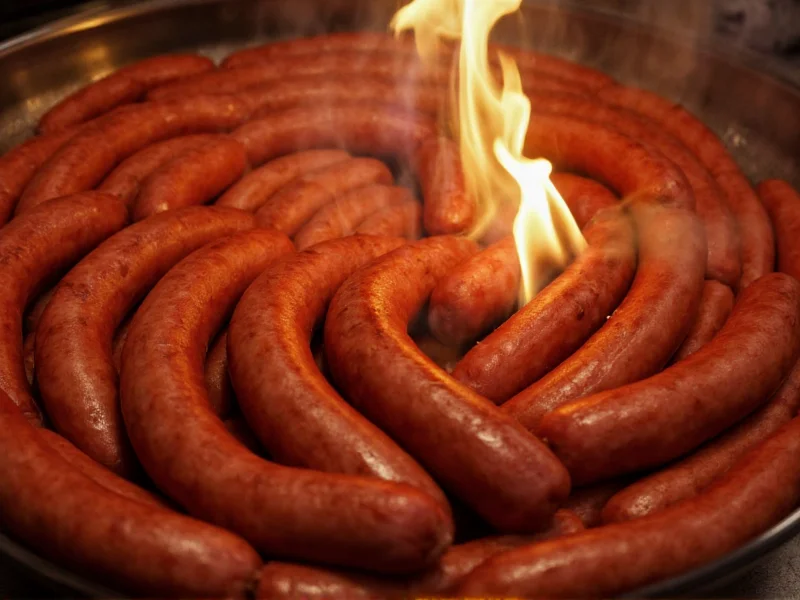The ending of Sausage Party reveals that after Frank the sausage and his grocery friends expose the truth about humans eating food, they overthrow the supermarket. In the final scene, sentient non-perishable foods (like gum and liquor) disclose they've been observing perishable foods for centuries, creating a cyclical commentary on religious belief systems. This philosophical conclusion suggests that even the non-perishables might be food for higher beings, completing the film's satirical take on organized religion.
Released in 2016, Sausage Party delivers one of the most unexpectedly profound conclusions in adult animation history. While marketed as a crude comedy about anthropomorphic grocery items, the film's ending transforms it into a sharp satire about religious dogma and the nature of belief. Understanding what happens in the Sausage Party ending requires examining both the surface-level plot resolution and the deeper philosophical commentary.
Breaking Down the Final Sequence
After Frank (voiced by Seth Rogen) and his companions discover the horrifying truth that humans consume food rather than transport them to a "Great Beyond," they return to Shopwell's supermarket to warn their fellow groceries. This revelation triggers a full-scale food-human war where groceries weaponize supermarket items against shoppers.
The climax features groceries successfully taking control of the store, establishing their own society free from human "gods." However, the true revelation comes when they discover a hidden section containing sentient non-perishable foods who have been silently observing everything.
The Philosophical Revelation
The non-perishable foods—led by Firewater (Bill Hader), Gum (James Franco), and Liquor (Salma Hayek)—explain they've witnessed countless generations of perishable foods believing in the "Great Beyond" myth. Their famous line: "We've been watching you for centuries. You're not the first groceries to come here."
This moment reframes the entire narrative. Just as perishable foods believed humans were gods, the non-perishables reveal they themselves might be food for some higher beings. The film concludes with Firewater ominously stating, "There's no Great Beyond. There's no one else. There's just us. There's what we do now."
| Element | Symbolic Meaning | Real-World Parallel |
|---|---|---|
| Humans | Perceived gods | Religious deities |
| Supermarket | Believed afterlife | Heaven/paradise concepts |
| Non-perishables | Higher observers | Pantheon of gods |
| "Great Beyond" myth | Religious narrative | Organized religion doctrines |
Director's Intent Behind the Sausage Party Conclusion
Co-director Conrad Vernon and writers Seth Rogen and Evan Goldberg deliberately crafted this ending to challenge religious thinking through absurdist comedy. In interviews, they explained that the Sausage Party movie ending meaning directly comments on how belief systems form around unverifiable claims about what happens after death.
The film's creators wanted to explore what would happen if a religious community suddenly received concrete evidence disproving their central doctrine. Frank's journey from devout believer to truth-seeker mirrors real-world challenges to religious orthodoxy.
Common Misinterpretations of the Ending
Many viewers initially miss the deeper meaning of the Sausage Party final scene explanation. Some common misunderstandings include:
- Believing the non-perishables represent actual gods rather than another layer in the food chain
- Mistaking the ending for pure nihilism rather than a call for meaning-making in the present
- Overlooking the mid-credits scene where Douche survives in the human world, continuing the cycle
The ending isn't suggesting life is meaningless, but rather that meaning comes from how communities treat each other in the present—not from promises of future rewards. This nuanced message separates Sausage Party from typical raunchy comedies.
Why the Ending Resonates Beyond the Comedy
Despite its crude humor, the Sausage Party philosophical ending has sparked serious academic discussion. Religious studies scholars have noted how effectively the film illustrates:
- The formation of religious institutions after initial revelations
- The role of "prophets" (like Frank) who challenge established dogma
- How communities handle cognitive dissonance when beliefs are challenged
The film's conclusion works because it transforms what appears to be juvenile humor into a legitimate commentary on faith, doubt, and community building—making the Sausage Party ending explained one of cinema's most unexpectedly thoughtful conclusions.
What is the meaning behind the Sausage Party ending?
The ending reveals a cyclical commentary on religious belief systems. When sentient non-perishable foods disclose they've been observing perishable foods for centuries, it shows that the "Great Beyond" myth is just one layer in a larger cosmic food chain. This satirizes how religious doctrines often explain the unknown while suggesting meaning comes from present community rather than promises of an afterlife.
Is there a post-credits scene in Sausage Party?
Yes, Sausage Party features a mid-credits scene where Douche (the villain) is revealed to have survived. He's working at a drugstore, continuing his journey as a sentient food item in the human world. This scene hints at potential sequels while maintaining the film's thematic continuity.
Why do the non-perishable foods matter in the Sausage Party ending?
The non-perishable foods (gum, liquor, etc.) represent a higher observational layer in the film's satirical universe. Their revelation that they've watched perishable foods believe in the "Great Beyond" for centuries completes the movie's central metaphor about religious belief systems, showing that even observers might be part of a larger food chain—paralleling how religious hierarchies often position themselves.
Does Sausage Party have a serious message despite its crude humor?
Absolutely. Beneath the raunchy comedy, Sausage Party delivers a thoughtful critique of religious dogma and belief systems. The ending specifically challenges the notion of blind faith in unverifiable afterlife promises, suggesting that meaning comes from how communities treat each other in the present moment rather than promises of future rewards.
How does the Sausage Party ending connect to the film's overall theme?
The ending perfectly encapsulates the film's central theme: how belief systems form around unverifiable claims about what happens after death. By revealing that the non-perishable foods have witnessed countless generations of perishables believing in the "Great Beyond," the conclusion shows how religious narratives perpetuate themselves while suggesting that meaning comes from present community rather than promises of future rewards.











 浙公网安备
33010002000092号
浙公网安备
33010002000092号 浙B2-20120091-4
浙B2-20120091-4